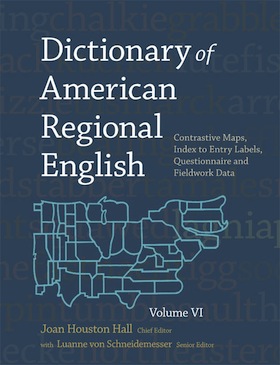DARE publishes companion volume to landmark dictionary
There are more than 200 ways to say someone is stalling, but the Dictionary of American Regional English is not dilly-dallying when it comes to showcasing the full depth of linguistic creativity around the country.

The dictionary known as DARE, a landmark project housed at the University of Wisconsin–Madison, now has a companion volume that gives readers a chance to dig deep into the definitive source on American speech from the first colonists to our neighbors today.
DARE Vol. VI includes lists of answers to more than 400 of the questions posed by UW researchers who conducted interviews in 1,002 communities across the country between 1965 and 1970.
“The lists of terms given in response to some of the DARE questions can provide new research ideas for linguists, but they are also fun to browse,” says Joan Houston Hall, DARE’s chief editor.
Readers will find:
- 212 ways of saying that someone is stalling, going from beating around the bush, to shilly-shallying, to whipping the devil around the stump.
- 105 different terms for pancakes, including flapjacks, flapperjacks, and slapjacks, as well as batter cakes, flannel cakes, griddle cakes, and hotcakes.
- 189 ways to describe a bad driver, including cowboy, roadhog, widow maker, and someone who bought his license at Sears and Roebuck.
The new volume also includes sets of maps showing how synonyms are distributed across different areas of the country, allowing readers to see at a glance where Americans say “kitty-corner” rather than “catty-corner,” for example.

Hall
The dictionary’s previous five volumes were arranged alphabetically. Hall says the new index makes it easy for readers to see what words are characteristic of a particular state, how speakers of American English have added new words or forms to our language and what words have come from other languages.
Hall’s personal favorite is “lagniappe,” a Louisiana term for a small bonus included with a purchase, or anything that’s thrown in for good measure. “It comes into English from French, it came into French from Spanish, and it came into Spanish from Quechuan,” she says.
DARE will release an electronic edition next year and Hall says the dictionary may eventually do follow-up research in the communities that were part of the original survey.
For more information, examples of regional terms, quizzes, photos, audio and other resources, visit this website or DARE’s homepage.
The dictionary can be purchased from bookstores prior to the holidays or pre-ordered from Harvard University Press in advance of its official publication date in January.
